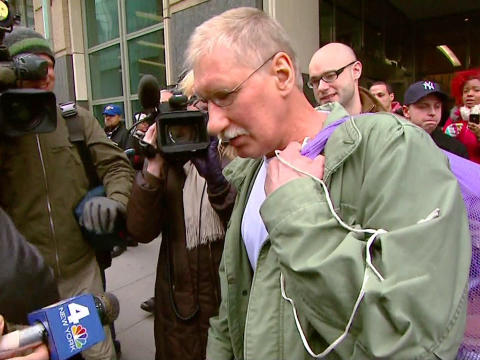 The mystery that began the murder of Rabbi Chaskel Werzberger continues as the man convicted of the crime was released last month after being deemed “not guilty.” In 1991, David Ranta was convicted of attempted robbery and murder of a Chasidic jewelry courier. Now, 58 years old, Ranta has been freed based on an absence of physical evidence. Ranta’s attorney, Michael Baum, incited the investigation by the Brooklyn District Attorney’s Conviction Integrity Unit.
The mystery that began the murder of Rabbi Chaskel Werzberger continues as the man convicted of the crime was released last month after being deemed “not guilty.” In 1991, David Ranta was convicted of attempted robbery and murder of a Chasidic jewelry courier. Now, 58 years old, Ranta has been freed based on an absence of physical evidence. Ranta’s attorney, Michael Baum, incited the investigation by the Brooklyn District Attorney’s Conviction Integrity Unit.
The allegedly wrongful conviction was due to the social pressure from the community to finish up the case and to unlawful conduct on behalf of a detective involved in the case. A piece of evidence for this even included a chasidic man who was used as a witness and coached to lie. Also, the main witness that led to Ranta’s conviction was a man who utilized his conversations with the police to receive immunity from many crimes and charges of his own. Additionally, Ranta denied ever providing a confession. The confession on record is not a recording, but rather came from a detective’s notes — the same format as the rest of the evidence from the case.
As reported by The Jewish Week, the evidence that led to Ranta’s release took years to become sufficiently substantial.
“As in almost all wrongful conviction litigations, so-called new evidence of innocence is known to prosecutors and judges  years, sometimes decades, before a case is finally resolved,” Lonnie Soury, an expert in wrongful convictions explained to The Jewish Week.
years, sometimes decades, before a case is finally resolved,” Lonnie Soury, an expert in wrongful convictions explained to The Jewish Week.
Brooklyn District Attorney Charles Hynes was completely aware of the evidence for years prior to when the information was revealed. This delay is believed to be due to his fear of tarnishing his record with election year approaching. The “mistake” caused the innocent Ranta to spend over 20 years in prison.
The only concrete nugget of knowledge in the case is that the murder occurred during a man’s attempted robbery of jewelry courier Chaim Weinberger on February 8, 1990. Weinberger managed to escape the robbery, but the criminal, frantically searching for a getaway car, approached Rabbi Werzberger’s vehicle, idling nearby. He then shot the rabbi, dragged him out of the car, and drove off. The beloved rabbi and Holocaust survivor succumbed to his injuries four days later.
Ranta was arrested six months later following increased pressure from the religious community. After being placed in a line-up, Ranta was passed up by the Chasidic teenage boy witnesses. Weinberger, the only person who saw the criminal, did not recognize Ranta as the man who tried to rob him.
Weinberger recounted in March of this year to The Jewish Week that he continually insisted to Barry Schreiber, one of the prosecutors, that Ranta was definitely not the man the police were searching for.
 The conduct of the lead detective, Louis Scarcella, was extremely questionable, causing the lead judge, Francis C. Egitto, to doubt the confession (and why it was not recorded on tape). Despite Egitto’s suspicion of Scarcella, Ranta was convicted in May of 1991 on two counts of second-degree murder as well one count each of robbery and attempted robbery.
The conduct of the lead detective, Louis Scarcella, was extremely questionable, causing the lead judge, Francis C. Egitto, to doubt the confession (and why it was not recorded on tape). Despite Egitto’s suspicion of Scarcella, Ranta was convicted in May of 1991 on two counts of second-degree murder as well one count each of robbery and attempted robbery.
Recently, Scarcella, the retired detective accused of creating muddy evidence, decided it was time to speak out in his own defense. Scarcella denies coaching witnesses and explained that the use of a drugged-out prostitute as the sole witness in five murder convictions was necessary, as he insists that her testimony was “weird, but true.” To this day, he maintains that Ranta is guilty of murder.

